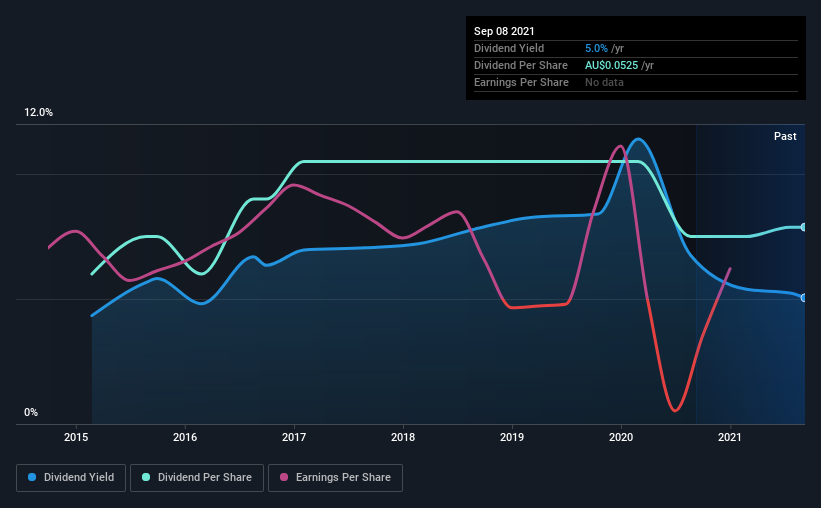Sandon Capital Investments' (ASX:SNC) Upcoming Dividend Will Be Larger Than Last Year's
The board of Sandon Capital Investments Limited (ASX:SNC) has announced that the dividend on 5th of November will be increased to AU$0.028, which will be 10.0% higher than last year. This will take the dividend yield from 5.0% to 5.0%, providing a nice boost to shareholder returns.
View our latest analysis for Sandon Capital Investments
Sandon Capital Investments Is Paying Out More Than It Is Earning
If the payments aren't sustainable, a high yield for a few years won't matter that much. Before this announcement, Sandon Capital Investments was paying out 206% of what it was earning, and not generating any free cash flows either. This high of a dividend payment could start to put pressure on the balance sheet in the future.
Looking forward, EPS could fall by 4.2% if the company can't turn things around from the last few years. If the dividend continues along recent trends, we estimate the payout ratio could reach 251%, which could put the dividend in jeopardy if the company's earnings don't improve.
Sandon Capital Investments' Dividend Has Lacked Consistency
Sandon Capital Investments has been paying dividends for a while, but the track record isn't stellar. This makes us cautious about the consistency of the dividend over a full economic cycle. Since 2014, the dividend has gone from AU$0.04 to AU$0.052. This works out to be a compound annual growth rate (CAGR) of approximately 4.0% a year over that time. Modest growth in the dividend is good to see, but we think this is offset by historical cuts to the payments. It is hard to live on a dividend income if the company's earnings are not consistent.
Dividend Growth May Be Hard To Achieve
With a relatively unstable dividend, it's even more important to see if earnings per share is growing. In the last five years, Sandon Capital Investments' earnings per share has shrunk at approximately 4.2% per annum. If earnings continue declining, the company may have to make the difficult choice of reducing the dividend or even stopping it completely - the opposite of dividend growth.
Sandon Capital Investments' Dividend Doesn't Look Great
In summary, investors will like to be receiving a higher dividend, but we have some questions about whether it can be sustained over the long term. The company isn't making enough to be paying as much as it is, and the other factors don't look particularly promising either. Overall, the dividend is not reliable enough to make this a good income stock.
Investors generally tend to favour companies with a consistent, stable dividend policy as opposed to those operating an irregular one. However, there are other things to consider for investors when analysing stock performance. Case in point: We've spotted 6 warning signs for Sandon Capital Investments (of which 1 makes us a bit uncomfortable!) you should know about. If you are a dividend investor, you might also want to look at our curated list of high performing dividend stock.
This article by Simply Wall St is general in nature. We provide commentary based on historical data and analyst forecasts only using an unbiased methodology and our articles are not intended to be financial advice. It does not constitute a recommendation to buy or sell any stock, and does not take account of your objectives, or your financial situation. We aim to bring you long-term focused analysis driven by fundamental data. Note that our analysis may not factor in the latest price-sensitive company announcements or qualitative material. Simply Wall St has no position in any stocks mentioned.
Have feedback on this article? Concerned about the content? Get in touch with us directly. Alternatively, email editorial-team (at) simplywallst.com.

 Yahoo Finance
Yahoo Finance 
